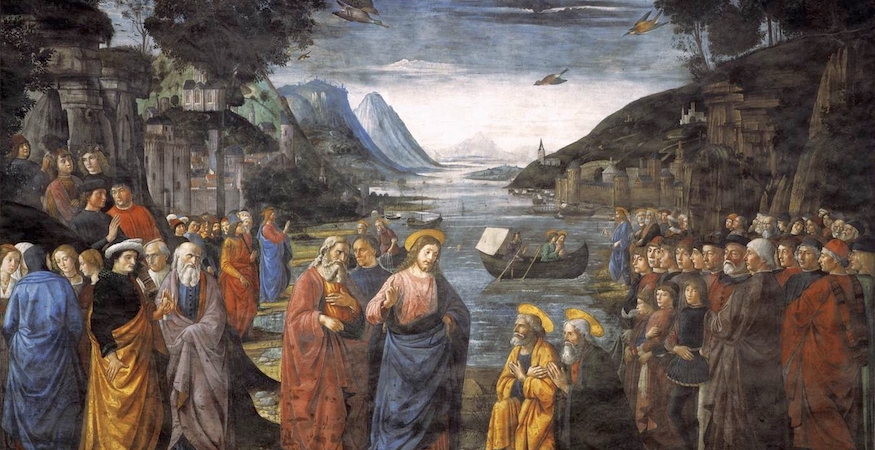Apostles’ Creed & Israel
The Early Church
Christianity formulated throughout the ages its Christian faith. The Church Fathers meant well. They tried to protect the mystery of the Trinity and of the two natures of Christ against all kinds of attack and heresies. Although the way they formulated and expressed the facts of faith is basically Greek-philosophical in nature, they were not thinking to give an ontological statement about God or Christ or the Holy Spirit but simply to protect the mystery that is there against all kinds of attack, one could put various question marks behind some of these formulas. But basically, they were right and beautiful. And ‘Christians for Israel’ in its almost 40 years of existence regarded them in general as the basic statements of faith for their ministry, and never felt the inclination to produce a new set of statements of faith expressing our Christian belief. The early church produced many beautiful creeds. To mention some of them:
Apostles’ Creed
The Apostles’ Creed (Latin: Symbolum Apostolorum or Symbolum Apostolicum), sometimes entitled Symbol of the Apostles, is an early statement of Christian belief. It is widely used by a number of Christian denominations for both liturgical and catechetical purposes, most visibly by liturgical Churches of Western tradition, including the Catholic Church, Lutheranism and Anglicanism. It is also used by Presbyterians, Methodists and Congregationalists.
The Apostles’ Creed is Trinitarian in structure with sections affirming belief in God the Father, Jesus Christ His Son and the Holy Spirit. The Apostles’ Creed was based on Christian theological understanding of the Canonical gospels, the letters of the New Testament and to a lesser extent the Old Testament. Its basis appears to be the old Roman Creed known also as the Old Roman Symbol. Because of the early origin of its original form, it does not address some Christological issues defined in the Nicene and other Christian Creeds. It thus says nothing explicitly about the divinity of either Jesus or the Holy Spirit. Nor does it address many other theological questions which became objects of dispute centuries later.
The first mention of the expression “Apostles’ Creed” occurs in a letter of AD 390 from a synod in Milan and may have been associated with the belief, widely accepted in the 4th century, that under the inspiration of the Holy Spirit, each of the Twelve Apostles contributed an article of a creed.
This creed is called the Apostles’ Creed not because it was produced by the Apostles themselves but because it contains a brief summary of their teachings. It sets forth their doctrine “in sublime simplicity, in unsurpassable brevity, in beautiful order, and with liturgical solemnity.” In its present form it is dated no later than the fourth century. More than any other Christian creed, it may justly be called an ecumenical symbol of faith.
Nicene Creed
The Nicene Creed, also called the Nicaeno-Constantinopolitan Creed, is a statement of the orthodox faith of the early Christian church in opposition to certain heresies, especially Arianism. These heresies, which disturbed the church during the fourth century, concerned the doctrine of the Holy Trinity and of the Person of Christ. Both the Greek (Eastern) and the Latin (Western) church held this creed in honor, though with one important difference: the Western church insisted on the inclusion of the phrase “and the Son” known as the “Filioque”, a theological point of discussion that ultimately in A.D. 1054 led to the split between the Churches of the East and the church of the West, thus being one of the causes of the Great Schism between Rome and the rest of the Church. In the article on the procession of the Holy Spirit this phrase still is repudiated by the Eastern Orthodox Church.
In its present form this Nicene Creed goes back partially to the Council of Nicea (A.D. 325) with additions by the Council of Constantinople (A.D. 381). It was accepted in its present form at the Council of Chalcedon in 451, but the “Filioque” phrase was not added until 589. However, the creed is in substance an accurate and majestic formulation of the Christian faith of the Early Church, as formulated at the First and Second Ecumenical Councils. It was defined by the Church Fathers of those first two councils (held in Nicea and Constantinople, respectively) to combat various heresies: notably Arianism, Apollinarianism, Macedonianism (also called Pneumatomachianism), and Chiliasm. So Christ’s coming reign on earth was rejected at that stage of Church History! One more reason to come up with an addendum to these Creeds!
Some scholars believe that the Nicene Creed promulgated by the First Ecumenical Council was based on an earlier baptismal creed used in Palestine (the Apostles’ Creed), while others regard its more likely origin as being a creed issued early in 325 A.D. in Antioch, a so-called “Syrian Creed.”
The Coptic Church has a tradition that the Nicene Creed was authored by St. Athanasius of Alexandria (A.D. 293-373), whose theology was instrumental at the Nicene council, despite his being only a deacon at the time. Athanasius, the champion of orthodoxy against Arian attacks on the doctrine of the Trinity. Although Athanasius did not write this creed and it is improperly named after him, the name persists because until the seventeenth century it was commonly ascribed to him. It is not from Greek (Eastern), but from Latin (Western) origin, and is not recognized by the Eastern Orthodox Church today. Apart from the opening and closing sentences, this creed consists of two parts, the first setting forth the orthodox doctrine of the Trinity, and the second dealing chiefly with the incarnation and the two-nature doctrine.
Martin Luther
The ‘Ninety-five Theses’ or ‘Disputation on the Power of Indulgences’ are a list of propositions for an academic disputation written in 1517 by Martin Luther, professor of moral theology at the University of Wittenberg, Germany, that started the Reformation, which profoundly changed Europe. In the Theses, Luther claimed that the repentance required by Christ in order for sins to be forgiven involves inner spiritual repentance rather than merely external sacramental confession. He argued that indulgences led Christians to avoid true repentance and sorrow for sin, believing that they could forgo it by purchasing an indulgence. They also, according to Luther, discouraged Christians from giving to the poor and performing other acts of mercy, believing that indulgence certificates were more spiritually valuable. Luther sent the ‘Theses’ enclosed with a letter to Albert of Brandenburg, the Archbishop of Mainz, on 31 October 1517, a date now considered the start of the Reformation and commemorated annually as Reformation Day. Luther may have also posted the ‘Theses’ on the door of All Saints’ Church and other churches in Wittenberg in accordance with University custom on 31 October or in mid-November. The ‘Theses’ were quickly reprinted, translated, and distributed throughout Germany and Europe.
“The ‘Five Solas’ still shine as a kind of 5-point star of the Reformation”
Five Solas
A lot of the work of the Reformation was wonderful. The ‘Five Solas’ still shine as a kind of 5-point star of the Reformation.
First, there is Sola Fide, which means salvation is by “faith alone.” We are saved by faith in Christ, not faith plus works. Faith plus works has never and will never equal salvation. Faith equals justification that results in good works, but our works do not contribute to or merit salvation.
Second, there is Sola Gratia or salvation by “grace alone.” We are saved by God’s unmerited favor—His goodness shown to us and received by us through faith in Christ’s sacrifice. This depicts salvation as a work where God works in our hearts. It is not a synergistic work where we coordinate God’s efforts with our own good works. Salvation is by grace alone.
Third, there is Solus Christus, which reminds us salvation is through “Christ alone.” This refers to His sacrificial work, but it also refers to His priestly, mediatorial work. We celebrate and we thank our pastors and priests, but we are not dependent upon them for a right standing with God, or for access to Him.
Fourth, there is Soli Deo Gloria, which means that salvation is accomplished for “God’s glory alone.” Our salvation is for His Glory; we are the beneficiary, but He is the One to be praised. As the Old Testament prophets declared, we are saved “for His Name’s sake.” Salvation is of the Lord.
Fifth and finally, is Sola Scriptura. By Sola Scriptura we mean that “Scripture alone” is the final authority for our lives and for the church. Since God’s Word is inspired and true, it is our final and sufficient authority.
“There is one thing basically lacking in all these ‘statements of faith’ – Not a word about Israel, the Jewish, the Promised Land, the earthly city of Jerusalem or the Kingdom of God”
Twelve Theses
‘Christians for Israel’ respects all these ‘statements of faith’ – and many more could be quoted that are held dear by many churches and denominations. We as a Christian ministry are not a church, but we want to serve the Church worldwide and Christianity at large. But with all the respect to all these and other great Creeds, we feel that there is one thing basically lacking. There is not a word about Israel, the Jewish, the Promised Land, the earthly city of Jerusalem or the Kingdom of God. And instead of proclaiming the hope that we have on the basis of the Bible and Gods everlasting Covenants with Israel, the Church over the centuries issued one negative statement after another about Israel and the Jewish people. Creating an atmosphere in which persecution of the Jews could flare up any minute, and ultimately leading to the murder of 6 million Jews in the Christian countries of Europe.
That is why a small international group of interdenominational theologians composed XII THESES of our Biblical faith and hope about Israel and the Jewish people. Why twelve Theses? There are twelve tribes of Israel, twelve apostles were sent into the world to proclaim the gospel of the Kingdom, the New Jerusalem has twelve gates and twelve fundaments, and in twelve articles (= the Apostle’s Creed) we confess the faith of the church of all times. Grateful for what we have received in them, we repeat these words, as a summary of Scripture’s witness concerning our salvation.
“How do we relate to the new, decisive stage into which God’s plan of salvation for His creation has entered?”
However, Scripture testifies about more. The election of Israel, God’s Covenants with Israel, the Kingship of Christ on the throne of David, the restoration of Israel and ultimately of the whole of creation, the bodily resurrection of the righteous dead, the prophetic future of the earthly city of Jerusalem, etc., – it is not in the beautiful words of the Creeds of the Church. The classic words of the confession need an addition. We are privileged to live in a time, in which we see how the people of Israel are restored into the land of the Promise. That makes us grateful. But it also causes a feeling of urgency. God’s plan of salvation for His creation has entered a new, decisive stage. How do we relate to it? And how do we relate to Israel? How does the church relate to Israel?
In that respect, Church History gives every reason for introspection and humility. Where the Creeds are silent about Israel, we often hear contempt of the Jews and of Israel in the history of the Church. Fortunately, through the ages, there have always been Christians who had great expectations for Israel on the basis of the Bible. Yet, their voices vanish against the overwhelming anti-Jewish tendencies in the church.
Five hundred years ago, Martin Luther was privileged to rediscover the Gospel of free Grace. The Reformation gave the Bible, the complete Bible, in the hands of every believer. For this, we are grateful. At the same time, it fills us with shame, that even Martin Luther has turned himself so vehemently against the Jews, with such disastrous effects until our own time. Celebrating five hundred years of the Reformation therefore is not possible without humiliation under this guilt.
“As a small group of theologians, we have come together with a deep-felt urgency to re-think our Christian faith and belief with regard to Israel and the Jewish people”
Once more, it urges us to take up what may well be the continuing heart of the Reformation: to read the Bible as new, over and over again, in her full width and depth. Many feel the need and the urgency to speak more broadly about God’s salvation plan with His creation from within the Scriptures. We, as a small group of theologians, we have come together with a deep-felt urgency to re-think our Christian faith and belief with regard to Israel and the Jewish people. In a sense, we do not represent anybody. It is only our desire to speak as members of the Body of Christ, in solidarity with the Church worldwide and standing on the basis of the Christian faith so beautifully expressed throughout the ages.
This has resulted in ‘Twelve Theses’ about the place of Israel in God’s plan of salvation, in which God’s election of Israel to bless the nations is elaborated. These articles do not replace any Creed or Confession of Faith whatsoever, but are meant as an addition, to fill up a gap in these Creeds, in order to stimulate new ways of contemplating the essential Biblical message concerning Israel and the kingdom, that the classic confessions have left open.
In a spirit of prayer and humility we offer these articles. Not to criticize the Church – we ‘are’ the Church – but out of love for the Church. In order that the Church will be blessed, Israel will be comforted and all with our eyes upon the Coming of the Lord and of His Kingdom.
The elaboration of these XII Theses (including the accompanying videos) can be found on this website on: https://www.c4israel.org/?s=XII+Theses
The entire playlist of the accompanying videos can also be watched on YouTube on:
https://www.youtube.com/watch?v=iArJR-uagEU&list=PLttoHYRTk1Z1R2Hy9Ug_IyMoHKYC2m03n
On behalf of this small group,
Rev. Willem J. J. Glashouwer
President Christians for Israel International
Honorary President European Coalition for Israel






